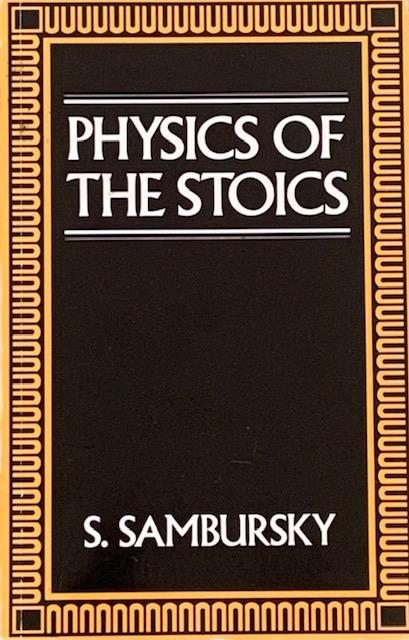So I learned about Physics of the Stoics via a wikipedia footnote and hunted down a copy because the protagonist of one of the novels I’m writing (Scratch) is a Stoic, in the formal sense.
And as I read about Stoicism (sticking to translations of ancient texts, since my protag isn’t a herd guy; he consults the originals, not the burgeoning pile of Stoic pop-lit) I became curious about what the ancient Greek stoics meant when they talked about “nature.”
Example, from Marcus Aurelius, Meditations.
Don’t ever forget these things: The nature of the world. My nature. How I relate to the world. What proportion of it I make up. That you are a part of nature, and no one can prevent you from speaking and acting in harmony with it, always.
What, I wondered, would Aurelius have meant when he thought about “nature”?
Physics of the Stoics helped me get a bit closer to imagining an answer (whether it’s the right answer or not, who knows. hahahaha.)
For the ancient Stoics, reality was permeated by pneuma, which they in some cases defined (as translated) as a substance consisting of “air” and “fire.”
What I try to do as I consider these concepts, however, is to achieve a kind of mental elasticity.
As a modern human, I was taught that pre-modern scientific models were nonsense. The world is made of whirling electrons, not a mix of air, fire, water, and earth.
But perhaps that dismissal is a bit too pat and a bit too arrogant.
Full disclosure: Per a review of Bernardo Kastrup’s Meaning in Absurdity that I recently posted on Goodreads, I’m a philosophical idealist. Ergo I believe that reality is actually consciousness, not matter.
Therefore, I believe that the models we use to examine reality and explain it phenomenologically are just that: models. Insofar as they seem real, it’s because we are interacting with reality and our interaction collapses possibility into the seemingly-objective.
So in considering how the ancient Greeks understood the world, perhaps their model was as valid as anything we’ve dreamed up.
I mean “valid” quite literally. In “Meaning,” Kastrup discusses the work of Thomas Kuhn, a 20th century philosopher of science, who proposed that objective data “cannot be gathered and interpreted outside the context of a paradigm,” defined by Kastrup as the “basic assumptions, values, and beliefs held by scientists about how nature is put together.” Continues Kastrup:
…we cannot know for certain that the laws of physics are the same throughout space and across time…paradigms change over time, and along with them what science considers to be true or reasonable.
Kastrup is careful to add a strong caveat that this is not an argument for relativism. But for the purposes of my Ancient Stoics thought experiment, insofar as they developed a model that made complete sense and actually explained the world, absolutely it was “valid.”
So, to play along: pretend you were never taught anything about modern physics, but understood the world strictly on the basis of your own senses and mind.
Air is, essentially, nothingness: it’s undetectable by our senses. Yes, we can detect its movement but not air per se.
Warm air is nothingness with a quality associated with life (warmth) (movement is another quality that is associated with life, and fire is both warm and in constant motion).
So why not propose a model of reality where everything is permeated by “air” (a nothingness that is also a something); and where “nothingness” merges with other qualities to generate phenomena such as objects and living beings?
In addition to qualities like warmth and movement, other subjective qualities such as rationality are also self-evidently aspects of that nothingness; after all, they have to arise from something, right?
That is pneuma. It is cohesive; it is everywhere; it must be what holds everything together. It is the “field” from which everything else arises. It’s the logos of the Gospel of John: there from the beginning, that through which all things are made: the light of man, the Christ consciousness.
To be clear, I’m not rejecting modern physics. That would be stupid; it’s very useful and I am eternally grateful to have been born today instead of 2500 years ago. But as a way of penetrating the nature of reality by seeing it through fresh eyes? This book was a lot of fun :)
Note: links in this post are affiliate links. If you click one and buy, I get a small percentage. It doesn’t add anything to the price.

